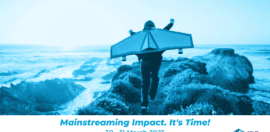2021 was a record year for venture capital – but only a fraction went to BIWOC founders

The CCO team celebrate the launch of Anyone Can. Photo: Ale Homez
5 April 2022 at 8:22 am
Following the release of a landmark report, The Creative Co-Operative has launched the first startup program by and for Bla(c)k women and women of colour in Australia.
Despite a record increase in the amount of venture capital (VC) funds being raised in Australia in 2021, just 0.03 per cent went to Bla(c)k women and women of colour founders, a new report finds.
The report from social enterprise The Creative Co-Operative (CCO) provides Australia’s first evidence base into the barriers experienced by Black women, Indigenous women, and women of colour (BIWOC) founders in the start-up ecosystem.
It found that only a quarter of BIWOC founders surveyed managed to raise any funding between 2019 and 2021. The most common source of funding was personal funds (57.1 per cent), followed by grants (47.6 per cent), and accelerators (28.6 per cent).
Of those who raised funds, only 9.5 per cent utilised VC funding, and 75 per cent raised less than $50,000. In total, just 0.03 per cent of the more than $10 billion of VC funds raised, went to BIWOC founders.
Priyanka Ashraf, The CCO founder and director, said the findings were uncomfortable but unsurprising.
“What’s really sad is that when I’ve spoken to other people who identify as Black women and women of colour, none of them were surprised,” Ashraf told Pro Bono News.
“[It demonstrates] that there is a significant way to go for Bla(c)k women and women of colour founders in Australia.”
She said the severe under-investment in BIWOC founders was due to a range of systemic barriers including lack of awareness of and access to funding opportunities and lack of mentoring opportunities.
But she said the first step towards solving a problem was naming it and measuring it.
Until now, intersectional data about BIWOC in Australia’s startup ecosystem has not been collected or reported against in order to inform decision-making.
Ashraf said the latest report, which was inspired by a similar study called ProjectDiane conducted biannually by Digital Undivided in the United States, set a benchmark for leadership in terms of what intersectional data collection looks like.
“When we talk about diversity there is almost this assumption that it is gender and it stops there, but if we stop there, we’re almost enforcing that the other groups are invisible. How can we serve them if we don’t know how bad the problems are that they are experiencing?,” she said.
“Although there are now data points that validate the problem, there are also data points that validate the opportunity.”
Focusing on a positive in the data, she highlighted that BIWOC founders demonstrated remarkable resilience, adaptability, and innovation during the pandemic.
“Statistically they were less impacted than other businesses. That means that diverse founders are less of a risky investment,” she said.
“It is that resilience that you develop as a result of really shitty reasons like sexism as well as racism, [but] in the context of entrepreneurship that is really such an opportunity.
“Investing in diverse founders isn’t just good, it’s actually good business.”
Anyone Can
In response to the findings, The CCO has launched a program to specifically support BIWOC in startups.
“Anyone Can” is supported by the Australian government Department of Industry, Science, Energy and Resources through the Women in STEM and Entrepreneurship program Round 3.
It aims to create more access for BIWOC founders in the startup ecosystem through three key phases:
- Identify – conducting research into the access barriers.
- Inspire – engaging the community in the findings through online activities and events and attracting more BIWOC into the ecosystem.
- Activate – running 101 startup education programs by and for BIWOC in a psychological safe space that sets them up for success to access and advance in the ecosystem.
Ashraf said it was important to understand that BIWOC founders were not starting from the same starting line as everybody else.
“They are two steps behind. Why is that? Because when they arrive here, particularly migrants, they don’t have the necessary elements to become startup founders, they don’t have knowledge, they don’t have networks, they don’t have know-how – without all of that you don’t have a fall-back,” she said.
“The problem isn’t necessarily that they are not advancing, the problem is that they’re not getting to the starting line.”
She said the program, which starts in May, would give 75 BIWOC the appropriate support required to, not just access, but advance in the Australian startup ecosystem.
Much of what is included in the program is influenced by Ashraf’s own experience of launching a startup and speaks to the gaps and challenges she faced not just as a founder but as a woman of colour.
At the end of the eight-week course each participant will deliver a pitch. Thanks to investments from Giant Leap and Scale Investors, two pitch winners will each receive $10,000 for business development.
Ashraf said she was optimistic that the ecosystem was leaning in.
“Ideally, no one should have to do this work in the first place, but let’s be real, we do have to do the work, and it’s happening. And I think that is something that is really exciting.”







